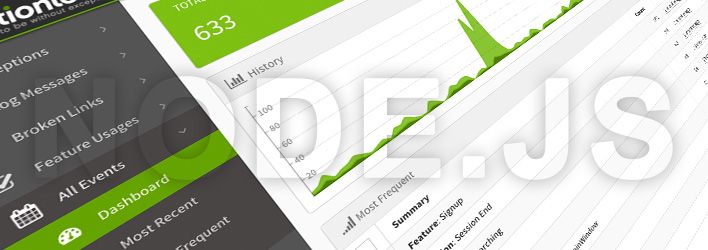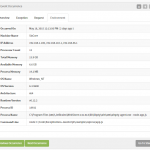
Last week we announced our full featured JavaScript client, and we're super excited about releasing a version 1.0 soon.
This week we'd like to put more details out there on the Node.js version of the JavaScript client, including installation, configuration, and usage. We've also set up an Express.js sample app that you can spin up locally to play with things.
Let's take a look.
How the JavaScript Client was Built
Our javascript client is built in typescript 1.5 and is transpiled to es5. We have a single client that works with both Node.js and JavaScript due to dependency injection and a Universal Module Definition (UMD). For capturing Node stack traces, we use Felixge's Node Stack Trace library.
Installing Exceptionless for Node.js
- Install the package by running
npm install exceptionless --save-dev - Add the Exceptionless client to your app:
var client = require('exceptionless.node').ExceptionlessClient.default;Configuring the Client
You can configure the Exceptionless client a few different ways for Node.js. The below is the most common way, but for more configuration options and documentation, visit the Exceptionless.JavaScript GitHub repo. NOTE: The only required setting you need to configure is the client's apiKey.
Set the apiKey on the default ExceptionlessClient instance.
var client = require('exceptionless.node').ExceptionlessClient.default;
client.config.apiKey = 'API_KEY_HERE';Sending Events
Once configured, the Exceptionless Node.js JavaScript client will automatically send your dashboard any unhandled exceptions that happen in your application. If you would like to send additional event types, such as log messages, feature usages, etc, take a look at the below examples.
Make sure to check out the Exceptionless.JavaScript GitHub Repo for the latest examples and documentation.
Sending Log Messages, Feature Usages, etc
var client = require('exceptionless.node').ExceptionlessClient.default;
client.submitLog('Logging made easy');
// You can also specify the log source and log level.
// We recommend specifying one of the following log levels: Trace, Debug, Info, Warn, Error
client.submitLog('app.logger', 'This is so easy', 'Info');
client.createLog('app.logger', 'This is so easy', 'Info').addTags('Exceptionless').submit();
// Submit feature usages
client.submitFeatureUsage('MyFeature');
client.createFeatureUsage('MyFeature').addTags('Exceptionless').submit();
// Submit a 404
client.submitNotFound('/somepage');
client.createNotFound('/somepage').addTags('Exceptionless').submit();
// Submit a custom event type
client.submitEvent({ message = 'Low Fuel', type = 'racecar', source = 'Fuel System' });Manually Sending Errors
In addition to automatically sending all unhandled exceptions, you can also manually send events to Exceptionless using our fluent event builder API.
The below example demonstrates sending a new error, "test," and setting the ReferenceID, Order and Quote properties, Tags, Geo, UserIdentity, and marking it as Critical.
var client = require('exceptionless.node').ExceptionlessClient.default;
try {
throw new Error('test');
} catch (error) {
client.createException(error)
// Set the reference id of the event so we can search for it later (reference:id).
// This will automatically be populated if you call client.config.useReferenceIds();
.setReferenceId('random guid')
// Add the order object (the ability to exclude specific fields will be coming in a future version).
.setProperty("Order", order)
// Set the quote number.
.setProperty("Quote", 123)
// Add an order tag.
.addTags("Order")
// Mark critical.
.markAsCritical()
// Set the coordinates of the end user.
.setGeo(43.595089, -88.444602)
// Set the user id that is in our system and provide a friendly name.
.setUserIdentity(user.Id, user.FullName)
// Submit the event.
.submit();
}Express.js Support
If you are using Express.js to develop a web application, you can add Exceptionless and start collecting unhandled errors and 404s very quickly. To start, just add the following middleware to the bottom of your middleware definitions.
// This middleware processes any unhandled errors that may occur in your middleware.
app.use(function(err, req, res, next) {
client.createUnhandledException(err, 'express').addRequestInfo(req).submit();
res.status(500).send('Something broke!');
});
// This middleware processes 404’s.
app.use(function(req, res, next) {
client.createNotFound(req.originalUrl).addRequestInfo(req).submit();
res.status(404).send('Sorry cant find that!');
});What Data is Collected?
The JavaScript/Node.js client is full featured, will collect all the information our other clients collect, and has a fluent API as shown above.
By default, we wire up to the processes' uncaught exception handler to automatically send any unhandled exceptions to your Exceptionless dashboard. We also submit a log message if your app doesn't shut down properly via inspecting the exit code, which is very useful and lets you know what your app is doing. Additionally, any queued up events are processed and sent before your app closes.
Each event contains environment and request information, as well, rounding out the complete list of Exceptionless features that we have made available via the JavaScript client, making it a great error and event reporting/logging solution for all your Node.js projects.

Sample Express.js App
We have built a quick Express.js sample app that you can play around with to get an idea of how the Node.js JavaScript client works with Exceptionless.
Run the sample app by following the steps below:
- Install Node.js
- Clone or download our repository from GitHub.
- Navigate to the example\express folder via the command line (e.g., cd example\express)
- Run npm install
- Open app.js in your favorite text editor and set the apiKey..
- Run node app.js.
- Navigate to http://localhost:3000 in your browser to view the express app.
- To create an error, navigate to http://localhost:3000/boom
Troubleshooting
We recommend enabling debug logging by calling client.config.useDebugLogger();. This will output messages to the console regarding what the client is doing. Please contact us by creating an issue on GitHub if you need assistance or have any feedback for the project.
Feedback
As we move forward towards version 1.0 of our JavaScript client, we are looking for any and all feedback, so please don't hesitate to let us know what you think, report a bug, etc.
Thanks!
